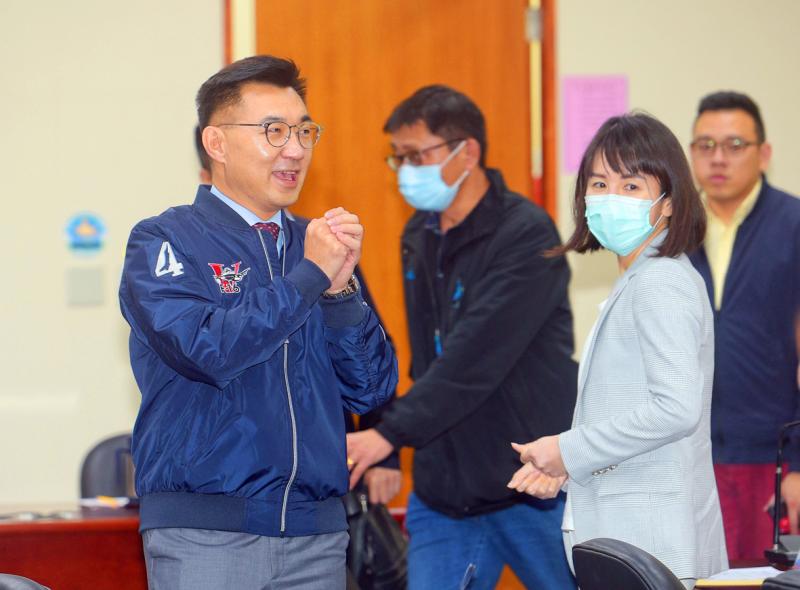Chinese Nationalist Party (KMT) Chairman Johnny Chiang (江啟臣) on Tuesday said that he is “both Taiwanese and Chinese” at a meeting with former KMT chairwoman Hung Hsiu-chu (洪秀柱).
The KMT is the Republic of China’s (ROC) founding party, Chiang said, adding that for the KMT, China is the ROC.
“I was born and raised in Taiwan. I am Taiwanese,” he said. “From the perspective of blood origin, culture and history, I am also Chinese.”

Photo: Chang Chia-ming, Taipei Times
“On the basis of the Constitution of the ROC, I am an ROC national,” he added.
Chiang and Hung reached a consensus during their discussion that the ROC Constitution is the basis for the nation’s standing in cross-strait relations, and that it should be a bipartisan consensus, Hung’s office said.
If that is to be changed, the Constitution would have to be amended, the office said, adding that political parties and politicians have a duty to explain the consequences and costs of amending the Constitution.
Like Hung, Chiang was elected after the KMT’s defeat in a presidential election, the office said, adding that the two understand the hardships that come with the position.
They understand that the party cannot appeal to young people just by recruiting a few of them, it said.
The two believe that young people have a negative opinion of the KMT mainly because of the Democratic Progressive Party’s (DPP) labeling of it, the office said.
While the influence of ideology is not the main reason young people dislike the KMT, the distortion of historical facts by school curriculum guidelines cannot be ignored, it said.
The ROC Constitution is a “one China” Constitution, Hung said.
The national direction set by the Constitution is ultimate unification, she said.
“These directions are challenges the chairperson of the founding party must face,” she said.
The ROC’s intrinsic territory is clearly stated in the Constitution, Chiang said, adding that as long as it has not been changed with constitutional amendments, it should be followed.
The ROC and the democratic system people cherish should be defended as preconditions for cross-strait peace and acceptance by the public, Chiang said.
In terms of identity, Chiang said he believes that the zhonghua (中華) — a term generally accepted to be approximate to “Chinese” — cultural heritage that was originally integrated into life and culture has been politicized, causing some things that did not need to be doubted to become problems stalling the nation.
Hung and Chiang have a high level of consensus in terms of their views of the importance of the KMT in the nation’s development and maintaining of the “status quo” and facing historical facts, Hung’s office said.
They hope that under the leadership of Chiang, the KMT can become a party that gives people hope and develops the nation, it added.

Taiwanese can file complaints with the Tourism Administration to report travel agencies if their activities caused termination of a person’s citizenship, Mainland Affairs Council Minister Chiu Chui-cheng (邱垂正) said yesterday, after a podcaster highlighted a case in which a person’s citizenship was canceled for receiving a single-use Chinese passport to enter Russia. The council is aware of incidents in which people who signed up through Chinese travel agencies for tours of Russia were told they could obtain Russian visas and fast-track border clearance, Chiu told reporters on the sidelines of an event in Taipei. However, the travel agencies actually applied

Japanese footwear brand Onitsuka Tiger today issued a public apology and said it has suspended an employee amid allegations that the staff member discriminated against a Vietnamese customer at its Taipei 101 store. Posting on the social media platform Threads yesterday, a user said that an employee at the store said that “those shoes are very expensive” when her friend, who is a migrant worker from Vietnam, asked for assistance. The employee then ignored her until she asked again, to which she replied: "We don't have a size 37." The post had amassed nearly 26,000 likes and 916 comments as of this

New measures aimed at making Taiwan more attractive to foreign professionals came into effect this month, the National Development Council said yesterday. Among the changes, international students at Taiwanese universities would be able to work in Taiwan without a work permit in the two years after they graduate, explainer materials provided by the council said. In addition, foreign nationals who graduated from one of the world’s top 200 universities within the past five years can also apply for a two-year open work permit. Previously, those graduates would have needed to apply for a work permit using point-based criteria or have a Taiwanese company

The Shilin District Prosecutors’ Office yesterday indicted two Taiwanese and issued a wanted notice for Pete Liu (劉作虎), founder of Shenzhen-based smartphone manufacturer OnePlus Technology Co (萬普拉斯科技), for allegedly contravening the Act Governing Relations Between the People of the Taiwan Area and the Mainland Area (臺灣地區與大陸地區人民關係條例) by poaching 70 engineers in Taiwan. Liu allegedly traveled to Taiwan at the end of 2014 and met with a Taiwanese man surnamed Lin (林) to discuss establishing a mobile software research and development (R&D) team in Taiwan, prosecutors said. Without approval from the government, Lin, following Liu’s instructions, recruited more than 70 software